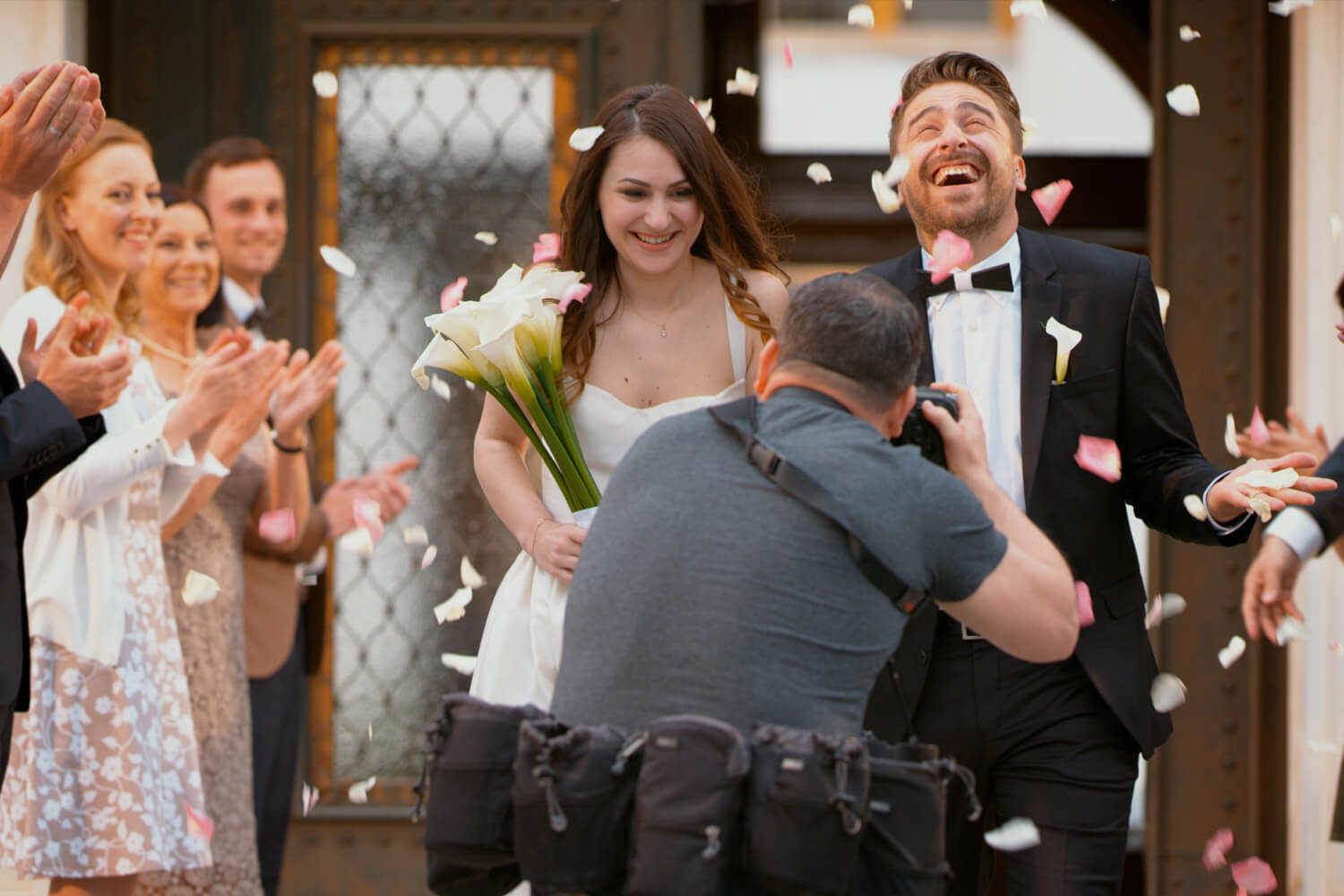Why You Need a Wedding Photography Contract

You've planned your dream wedding for months. The flowers are perfect. The venue is beautiful. But on your big day, your wedding photographer shows up two hours late and leaves before the cake cutting. Or worse, they never show up at all. Without a wedding photography contract, you have no proof of what was promised and may have no way to get your money back.
A clear wedding photography contract agreement avoids these problems. It sets expectations for both you and your photographer. It protects everyone involved and makes sure your special day goes smoothly.
This guide will explain everything you need to know about wedding photography contracts. You'll learn what should be included, why it matters, and how to protect yourself – before, during, and after your wedding date.

What is a wedding photography contract?
A wedding photography contract is a written agreement between you and your photographer. It lists all the services they will provide, how much you'll pay, and when everything will happen. It explains what the photographer will do and what you agree to pay. It also covers important details like image rights and what happens if something goes wrong.
The wedding photography agreement protects both the couple and the photographer. It helps prevent confusion and misunderstandings before they happen. And if you do run into problems during or after the wedding, revisiting your contract to see what the exact terms were will help protect you while you and the photographer resolve the issues.
Why a wedding photography contract matters
A wedding photography contract gives you peace of mind. You know exactly what to expect on your wedding day. There are no surprises about timing, costs, or what style of photos you'll receive.
Here's why you need a wedding photography contract:
- Prevents miscommunication - You'll know how many hours your photographer will stay, what style of photos you'll get, and when you'll receive your images.
- Protects against problems - If your photographer cancels, doesn't show up, or loses your images, the contract explains what the remedy is.
- Provides legal protection - If a dispute happens, you have written proof of what was agreed upon.
- Sets clear boundaries - Everyone knows their responsibilities, making the day run smoother.
Without a wedding photography contract agreement, you're taking a big risk with one of the most special parts of your wedding.
What should a wedding photography contract include?
A good wedding photography agreement covers several key areas. From the exact photography service you will receive to specific contract information and limitation of liability, your photography agreement should lay out exactly what you and your photographer expect while you are working together. Let's break them down so you know exactly what to look for.

Services and coverage details
Your contract should clearly state how long your photographer will be there. Will they shoot for six hours or ten? What time will they arrive and leave?
Other important details include:
- Whether a second photographer or assistant will help
- If they'll cover extra events like the rehearsal dinner
- How many edited photos you'll receive
- How long editing and retouching will take
- When and how you'll get your final images
Don't assume anything. If it's not in the wedding photography contract, it's not guaranteed.
Payment terms and deposit
Money matters need to be crystal clear. Your wedding photography contract should list the total cost and break down when payments are due.
Make sure the contract explains:
- The total price for all services
- How much deposit is required and when it's due
- When final payment must be made
- What happens if you miss a payment
- Whether deposits are refundable or non-refundable
Most photographers require a non-refundable deposit to hold your date. This protects them if you cancel. Understanding these terms before signing helps avoid surprises.
Cancellation and rescheduling policy
Life happens. Sometimes weddings get canceled or postponed. Your wedding photography contract agreement should explain what happens in these situations.
Look for details about:
- What happens to your deposit if you cancel
- Whether you can reschedule and if there are fees
- What happens if the photographer can't make it
- Policies for emergencies, illness, or weather
A good contract protects both sides. It should explain what happens if either the couple or the photographer needs to cancel.
Image rights and usage
Who owns your wedding photos? Can you print them anywhere? Can your photographer use them for advertising? These questions should be answered in your wedding photography agreement.
The contract should clearly state:
- Who holds the copyright to the images
- Whether you can print, share, and post photos online
- If the photographer can use your photos in their portfolio
- Whether they can use images for marketing or social media
Most photographers keep the copyright but give couples permission to use the images personally. Make sure you understand these terms before signing.
Liability and backup plans
What happens if equipment breaks? What if there's an emergency? Your wedding photography contract should address these "what if" scenarios.
Important liability clauses include:
- What happens if cameras or equipment fail
- Whether the photographer has backup gear
- If the photographer carries insurance
- Whether they have a backup photographer available
- Limits on the photographer's liability
A professional photographer will have backup plans in place. The contract should explain what those plans are.

How to make a wedding photography contract
Getting everything in writing is crucial. If a photographer doesn't offer a wedding photography contract, ask for one. Any professional should be happy to provide a written agreement.
When you receive the contract, read it carefully. Don't just skim it. Take your time and make sure you understand every section.
If something is unclear, ask questions. A good photographer will explain anything you don't understand. If they get defensive about questions, that's a red flag.
Consider having a lawyer review your wedding photography contract agreement before signing. This is especially important if you're paying thousands of dollars. A legal professional can spot problems you might miss.
Common mistakes to avoid with wedding photography agreements
Even with a contract, couples sometimes make mistakes. Avoid these common errors:
- Not reading thoroughly - Don't just sign without reading every word. You need to know what you're agreeing to.
- Overlooking image rights - Make sure you understand who owns the photos and how you can use them.
- Ignoring cancellation policies - Know what happens to your money if plans change.
- Failing to check delivery timelines - When will you actually get your photos? Make sure it's in writing.
Taking time to understand your wedding photography contract now prevents headaches later.
Examples of wedding photography contracts
Wondering how to write a photography contract or what one looks like? You can find examples and templates online, including when you become a LegalShield Member.
These templates are helpful starting points. They show you what sections to include and how contracts are typically structured. However, every wedding is different, and every photographer works differently.
Templates should be customized for your specific situation. What works for one couple might not work for another. Always have a legal professional review any contract before you sign it, even if you started with a template.

Protecting your memories with a solid agreement
Your wedding photos will last forever. They're how you'll remember one of the most important days of your life. A solid wedding photography contract ensures those memories are captured without stress or problems.
A good wedding photography agreement sets clear expectations. Both you and your photographer know exactly what's expected. This prevents disputes and helps everything run smoothly on your big day.
How LegalShield can help
Creating or reviewing a wedding photography contract doesn't have to be complicated. LegalShield Members get access to legal help when they need it most. Whether you need someone to review your photography contract or help with other legal issues surrounding your wedding, LegalShield provides affordable access to experienced lawyers.
LegalShield offers legal plans that give you peace of mind. Members can get contracts reviewed, ask legal questions, and receive guidance on important agreements. For couples planning a wedding, having legal support means one less thing to worry about.
Instead of paying hundreds of dollars for one-time legal advice, LegalShield Members pay a small monthly fee for ongoing access to legal help. This coverage extends beyond your wedding day to other life events and legal needs.
Take action today
Don't leave your wedding memories to chance. Always insist on a written wedding photography contract agreement. Read it carefully, ask questions, and have it reviewed by a legal professional.
Ready to protect your big day? Visit LegalShield.com today to learn how affordable legal protection can give you peace of mind for your wedding and beyond. Get the legal support you deserve—sign up now and take control of your important agreements.
Written by Elyse Dillard, Content Specialist at LegalShield. Elyse creates educational resources about legal and identity theft protection services. She works to make complex legal concepts more accessible to readers and has contributed to numerous articles on the LegalShield blog.
Pre-Paid Legal Services, Inc. ("PPLSI") provides this blog as a public service and for general information only. The information made available in this blog is meant to provide general information and is not intended to provide legal advice, render an opinion, or provide a recommendation as to a specific matter. The blog post is not a substitute for competent legal counsel from a licensed professional lawyer in the state or province where your legal issues exist, and you should seek legal counsel for your specific legal matter. All information by authors is accepted in good faith. However, PPLSI makes no representation or warranty of any kind, express or implied, regarding the accuracy, adequacy, validity, reliability, availability, or completeness of such information. The materials contained herein are not regularly updated and may not reflect the most current legal information. No person should either act or refrain from acting on the basis of anything contained on this website. Nothing on this blog is meant to, or does, create an attorney-client relationship with any reader or user. An attorney-client relationship may be formed only after the execution of an engagement letter with an attorney and after that attorney has confirmed that no conflicts of interest exist. Nothing on this website, or information contained or transmitted by this website, is intended to be an advertisement or solicitation. Information contained in the blog may be provided by authors who could be a third-party paid contributor.
PPLSI provides access to legal services offered by a network of provider law firms to PPLSI members through membership-based participation. Neither PPLSI is not a law firm, and its officers, employees or sales associates do not directly or indirectly provide legal services, representation, or advice.
LegalShield is a trademark of Pre-Paid Legal Services, Inc. (“LegalShield”). LegalShield provides this blog as a public service and for general information only. The information made available in this blog is meant to provide general information and is not intended to provide legal advice, render an opinion, or provide a recommendation as to a specific matter. The blog post is not a substitute for competent legal counsel from a licensed professional lawyer in the state or province where your legal issues exist, and you should seek legal counsel for your specific legal matter. All information by authors is accepted in good faith. However, LegalShield makes no representation or warranty of any kind, express or implied, regarding the accuracy, adequacy, validity, reliability, availability, or completeness of such information. The materials contained herein are not regularly updated and may not reflect the most current legal information. No person should either act or refrain from acting on the basis of anything contained on this website. Nothing on this blog is meant to, or does, create an attorney-client relationship with any reader or user. An attorney-client relationship may be formed only after the execution of an engagement letter with an attorney and after that attorney has confirmed that no conflicts of interest exist. Nothing on this website, or information contained or transmitted by this website, is intended to be an advertisement or solicitation. Information contained in the blog may be provided by authors who could be a third-party paid contributor. LegalShield provides access to legal services offered by a network of provider law firms to LegalShield members through membership-based participation. LegalShield is not a law firm, and its officers, employees or sales associates do not directly or indirectly provide legal services, representation, or advice.


